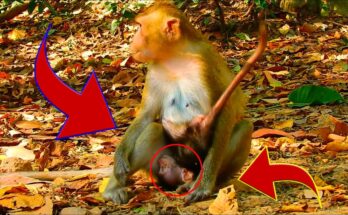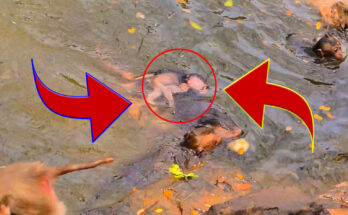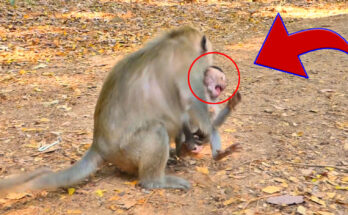In the vast kingdom of the animal world, the balance between nature and nurture often carries unexpected lessons for humans. One such tale can be drawn from observing the behavior of animals, particularly primates. Among these fascinating creatures, the dynamic between mother and baby is integral to the development of the young. But, just like with humans, the question of when to wean a baby from its mother’s breast milk often comes into focus. There are times when nature’s timing seems right, yet the mother is either not ready or simply unwilling to let go.
Imagine a mother monkey, deeply attached to her infant, and her reluctance to stop nursing even when the baby is well past the stage of infancy. There are some interesting psychological and social dynamics at play here that resonate deeply with human experiences. Monkeys, like humans, develop emotional bonds during the early stages of life, and breastfeeding is one of the most profound ways they bond. But, much like human children, there comes a time when the baby monkey is ready to explore the world beyond the comforting embrace of its mother’s milk.
Let’s envision the scene: a baby monkey, no longer tiny and vulnerable, but large, full of energy, and more than capable of finding its own food. The baby’s curiosity has grown exponentially, as has its physical size. Yet the mother, with an unwavering commitment to her role, continues to offer her breast milk, as if unaware that the baby has long outgrown the need. The baby, on the other hand, clearly expresses its discomfort, wriggling and turning away in frustration, signaling its desire for independence.
The situation is far from ideal. The baby, feeling increasingly restricted by the ongoing dependency on its mother’s milk, may begin to show signs of distress, manifesting in behaviors such as agitated movements or vocalizations. This could be the monkey’s way of telling its mother that it’s time to move on—time to begin the next phase of life, one that doesn’t involve constant nourishment from the mother’s breast. The more the mother insists on nursing, the more the baby becomes discontented, overwhelmed by the constraints of its maternal dependency.
This dynamic mirrors a universal theme seen in many animal and human relationships: the struggle for independence. While breastfeeding serves as an essential source of nourishment in the early stages of life, the transition to self-sufficiency is a natural, albeit difficult, step in the process of growing up. It’s a delicate balance that many mothers, both human and animal, often wrestle with—knowing when to let go and allow the young to grow on their own.
In the wild, weaning is often triggered by environmental factors or the innate instincts of the mother. When food sources become more accessible, or when the young animal begins to show signs of readiness, the mother will naturally reduce nursing. However, in situations where the mother is overly protective or emotionally attached, she might hesitate, inadvertently delaying the weaning process. This could lead to an imbalance in the young one’s emotional development and create confusion as to when it’s time to let go. For the monkey in this story, continuing to receive breast milk past its weaning age can lead to frustration, confusion, and a lack of personal growth.
The question arises: why would a mother monkey continue to nurse an older baby when it is clearly no longer in need of breast milk? There are several possible reasons. It might stem from a deep emotional attachment or an instinctual drive to nurture her offspring for as long as possible. Sometimes, this attachment manifests as an unwillingness to allow the baby to become independent. In other cases, the mother might simply be unaware of the negative impact it has on the baby. Such behavior can be a reflection of the instinct to protect and care for her young, even if it hinders their development.
From a broader perspective, this situation raises an important discussion about the dynamics of care, attachment, and independence. Whether it’s a monkey or a human, there are important lessons to be learned. We all go through stages where our caregivers have to let go, even when it’s tough, in order for us to grow and thrive. For the baby monkey, the time for independence has come, and its emotional wellbeing may very well depend on its mother recognizing that it is no longer a baby in need of constant care.
In conclusion, this story of a mother monkey who refuses to stop giving her big baby breast milk is one of delayed growth and emotional conflict. The baby is not happy, feeling trapped by the continuing reliance on its mother. It is a reminder that nurturing and attachment are important, but so is the need for independence. It is a delicate balance that every mother, human or animal, must navigate, ensuring that their child can eventually stand on its own two feet—strong, capable, and ready to face the world.


